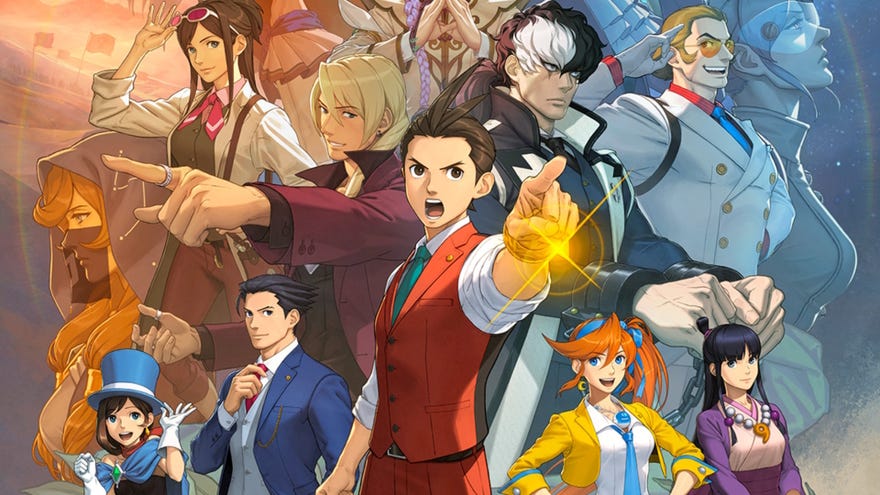Apollo Justice: Ace Attorney Trilogy review: the guilty pleasure boxset
Let's settle this
For a series that's defined by its trials and elaborate murder cases, the greatest crime in Ace Attorney history is arguably one we never get to see or take part in. Okay, maybe crime is too strong a word. Miscarriage of justice is perhaps more appropriate, and specifically that of Apollo Justice, the cover star of this latest trilogy in Capcom's beloved lawyer 'em up. Except poor old Apollo isn't really what holds this collection of Ace Attorneys 4, 5 and 6 together at all. Sure, he features in all of them, but at the end of the day, it's still the series' original bluffer supreme Phoenix Wright who heads up most of the casework here, relegating his new protegee back to bench-warming duties almost as soon as Apollo's debut game rolls its credits. What's more, he quickly has to share that space with Athena Cykes, another new hotshot lawyer that enters the firm in Dual Destinies and continues the scrappy defence trifecta in Spirit Of Justice.
The result is a set of games that feel considerably wobblier than Capcom's first and more robust Ace Attorney trilogy, and quite a bit more unfocused than the more recent Victorian-era spin-off, The Great Ace Attorney Chronicles. But despite a slightly unsure start, there are still plenty of career highs to be found here for Wright, Cykes and Justice, and Spirit Of Justice in particular remains one of the series' best entries to date. Those new to Ace Attorney should absolutely begin their journey elsewhere, but for series completionists, the Apollo Justice Trilogy is quite the welcome development.
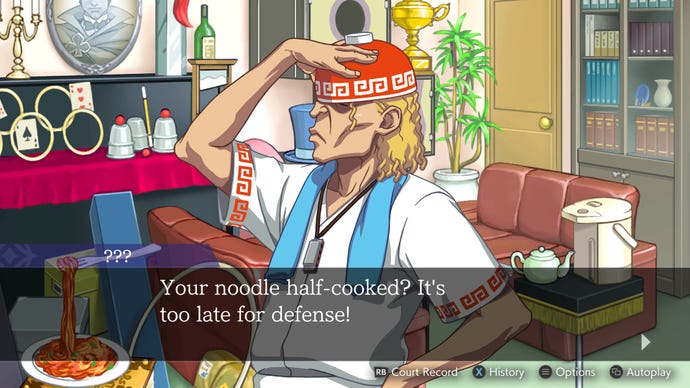
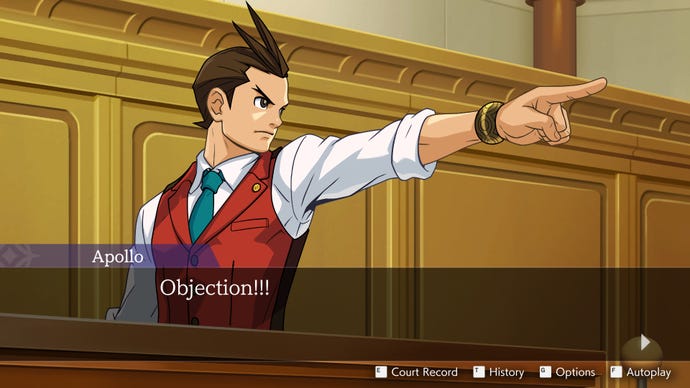
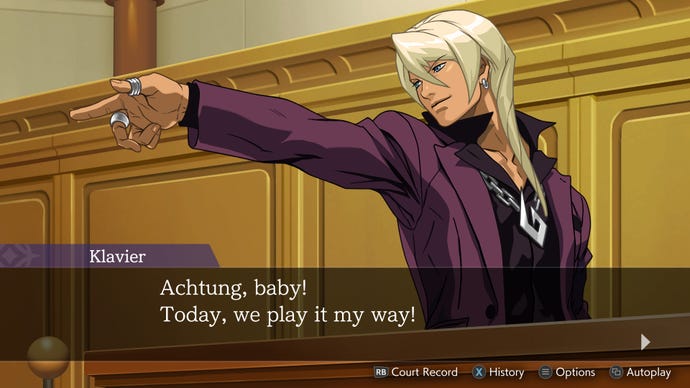
In terms of what you're getting here, there's the trio of mainline games: Apollo Justice, Dual Destinies and Spirit Of Justice, which have all been spruced up to modern day resolutions and are navigable by episode and individual chapters right from the off, letting you dive into your favourite part of each case without needing to complete them all first. You've also got the latter two games' respective special episodes, Turnabout Reclaimed, featuring an actual orca whale as the defendant, and Turnabout Time Traveler. Add in an 'Orchestra Hall' of both original, orchestral and trilogy exclusive music tracks, an animation studio where you can pose characters in a variety of settings sans text, an art library stuffed with character design sketches, in-game illustrations, backgrounds and cut-scene movies, and you've got quite a well-rounded and generous-feeling package here. Heck, it's almost enough to make up for the fact that Apollo Justice (the game) only has a mere four-pack of cases compared to the usual five (or six if you count the special eps here).
In Apollo Justice's defence, it may have fewer cases, but they are noticeably longer as a result, sometimes to its advantage and others to its detriment. For example, the third case involving a backstage murder at a pop concert suffers from some interminable repetition of a ballad whose lyrics seem to predict the events of the crime in question, and identifying tune discrepancies is made all the more laborious by having a sound mixing board as one of the key pieces of evidence. Then again, another case involving a noodle stand, an academic underwear thief and a mafia-style family of local business tycoons has all the room it needs to deliver twist upon twist to keep players on their toes, both as you go about collecting evidence during the investigation stage of each case, and when you're finding contradictions in witness testimonies during the court battles.
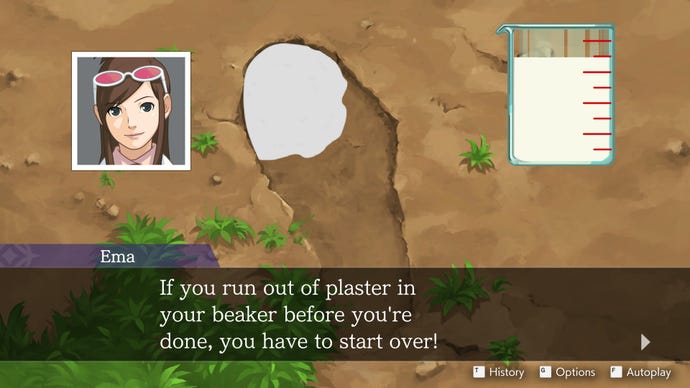
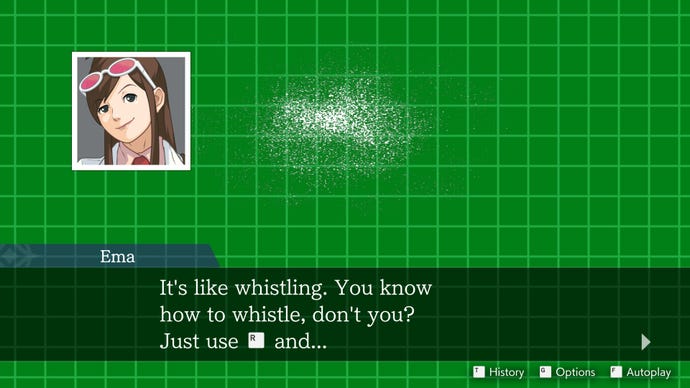
These investigations and court trials are once again the bread and butter of what you'll be doing in these Ace Attorney games, though some of its puzzles and visual flourishes feel rather diminished by the transition to PC from their former DS and 3DS homes. For example, some character reactions in Dual Destinies that previously lurched out toward the screen come across as rather flat in this new trilogy, and the forensic puzzles from Apollo Justice that were originally designed with the DS' microphone and touchscreen in mind are now all reduced to mere mouse clicks or button presses. I was also a bit sad that each of these techniques only received a single outing in Apollo Justice, and it's a shame they aren't developed further or combined in more interesting ways as the game goes on. Still, at least they work and require minimal effort to execute, which is more than can be said for the handful of 3D-specific plot points in Great Ace Attorney Chronicles, where even crossing my eyes failed to replicate the intended affect.
The tricks that do get a good showing, though, are Apollo, Athena, and Phoenix Wright's respective 'powers', which help them uncover hidden clues to further their lines of attack. Apollo has a special bracelet that lets him 'perceive' tiny twitches and nervous ticks when witnesses are testifying, whereas Athena's preternatural hearing can detect when the feelings in someone's voice don't match their outward facial expression, with her Mood Matrix software probing these moods for cracks. And Phoenix Wright is back with his Psyche-Lock-breaking Magatama bead, which can force cagey suspects to spill their secrets by presenting them with the right crop of evidence.
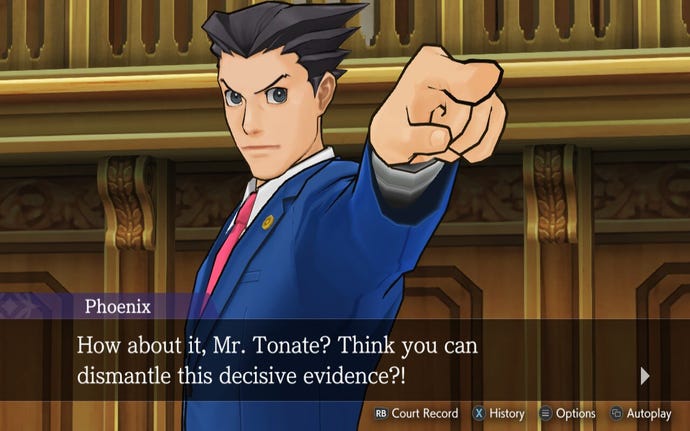
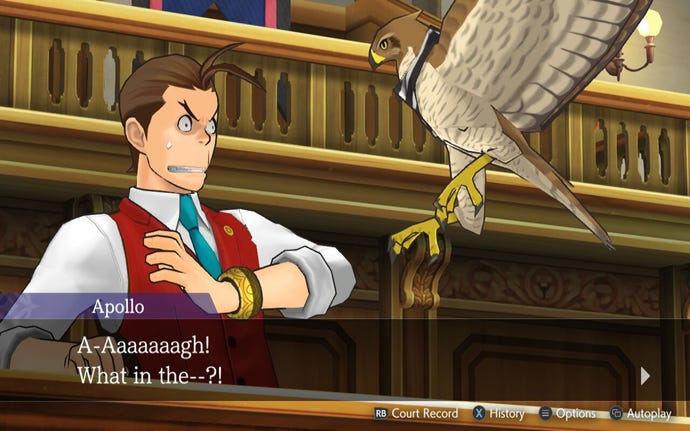
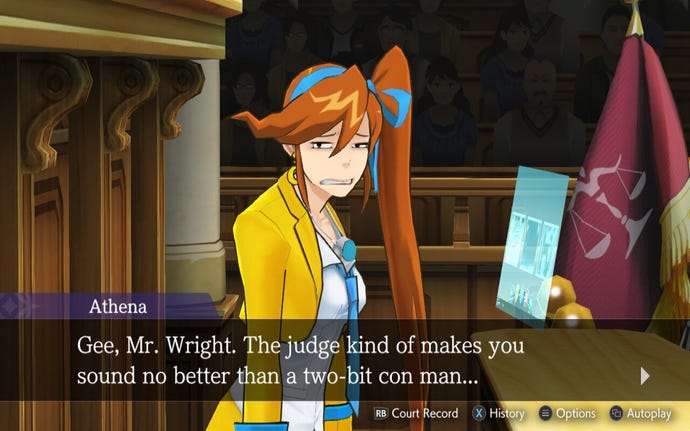
In Apollo Justice, the bracelet is used sparingly and to great effect, but when Dual Destinies throws multiple protagonists into the mix, the parade of alternating gimmicks can sometimes feel like there's very little real lawyering going on - a feeling not helped by having some of the most farcical characters of the series making everything feel even more over the top than usual (lookin' at you, Bobby Fullbright and Simon Blackquill). Spirit Of Justice almost brings this to breaking point when it throws divination seances onto the pile as well. Since this game takes place in the far away land of Khura'in, their court system brings a touch of the (even more) supernatural into play, with prosecutors able to dive back into the final moments of the deceased's life and literally 'see' through their eyes. Sights, sounds and feelings are all highlighted in short clips, adding yet another new spin on finding the contradictions in a piece of 'testimony'.
Thankfully, Spirit Of Justice manages to avoid veering into gimmick overload by carefully pacing out who takes the lead in each of its cases, keeping them all relatively separate until much later on in the game. This structure allows each defence attorney to breathe and do their thing without it all feeling a bit naff and silly, because yep, even the seances somehow end up feeling less daft than Athena's mood board. What's more, the way it brings them and their respective investigations together for the finale - both in Spirit Of Justice on its own and plot points from the wider trilogy - is truly up there with what's arguably still the peak of the series, which is the climax of the third game, Trials And Tribulations. That, and Spirit Of Justice's truly exceptional pun work in its localisation, is why it remains one of my all-timer Ace Attorney games.
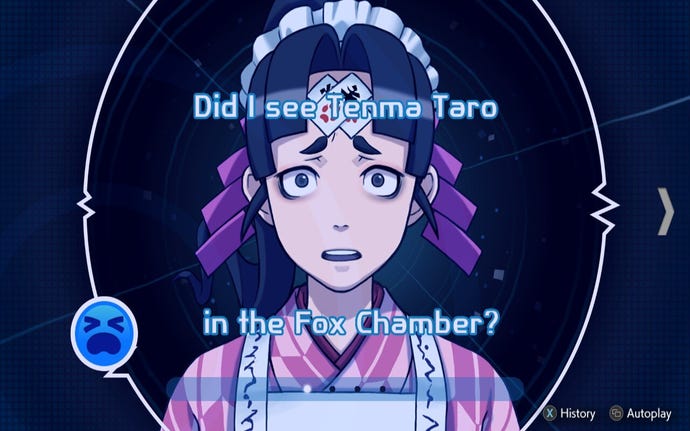
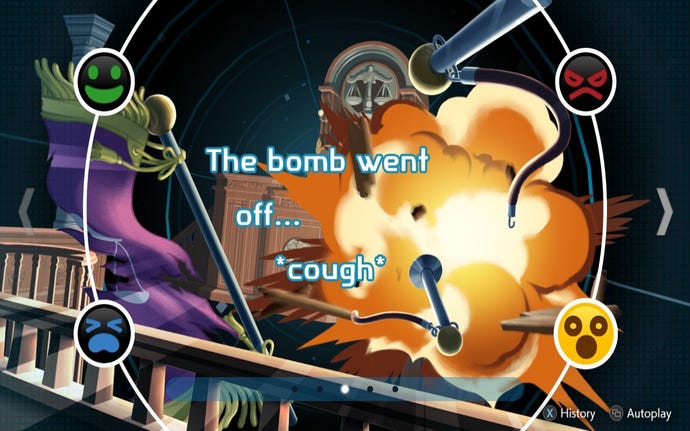
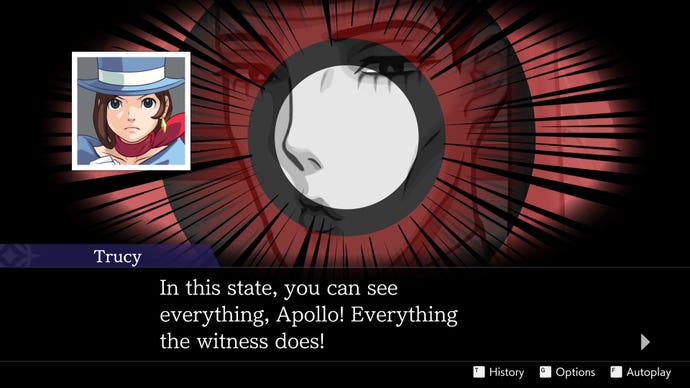
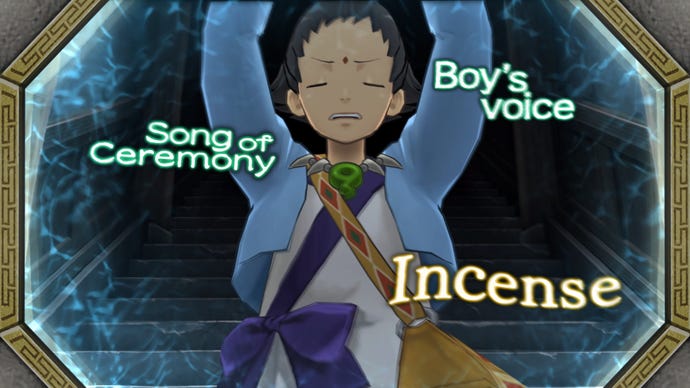
That's not to say Apollo Justice and Dual Destinies are total duds, though. The journey you go on in the aforementioned noodle stand case in Apollo Justice is just great fun from start to finish, and even the opening poker game-gone-wrong has some clever tricks up its sleeve when it comes to who and howtheydunnit. Likewise, the trial set inside a legal academy for aspiring prosecutors, judges and defence attorneys in Dual Destinies is a wonderfully comic tour de force that really lets Capcom's animation team strut their stuff. The space centre murder case towards the end of the game also uses the setting's multiple floors and exhibition pieces to great effect, crafting a deviously plotted murder sequence that almost makes up for the absolute stinker of a second case in Dual Destinies, because, yep, the lows really are quite low in this run of games, with many of them making a case for some of the worst episodes in the series.
This dreariness can, of course, be mitigated more effectively here thanks to the ability to dip your toes in and out of cases at will in its case selection menu - though I'd argue that this only really serves returning Nintendo players who know which cases to revisit and which ones to steer clear of. Taken as a whole, this trilogy ends up feeling a lot more uneven than either the first trio of Ace Attorney games, or the pair of Chronicles. Perhaps this is because none of them bear the fingerprints of series creator Shu Takumi (who was off making Great Ace Attorney Chronicles and Layton Vs Wright back then). Or maybe the sheer passage of time between Apollo Justice and Dual Destinies coming out made the renewed emphasis on Phoenix Wright and gradual sidelining of old Apollo feel more of a necessity after being so long out of the spotlight.
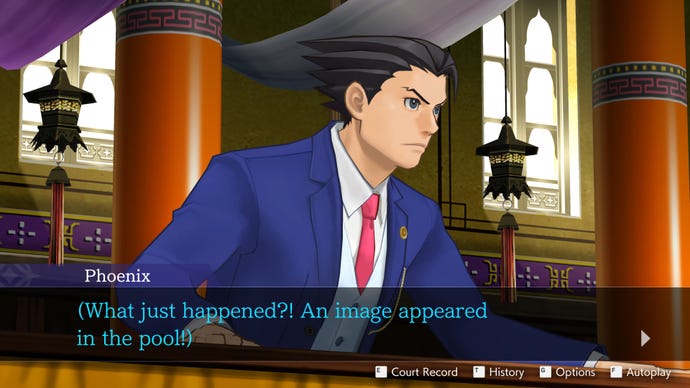
We can speculate as long as we want, of course, but based on the evidence in front of us, I'd begin my closing statement by saying there's still a good time to be had with the Apollo Justice Trilogy, and as the final piece in Capcom's Ace Attorney line-up on PC, it's great to see them finally freed from their former DS and 3DS confines (especially with those excellent special episodes in tact as well). As I said up the top there, this is not the trilogy that newcomers to the series should start with if they like the sound of its murder plots and visual novel-based legal sleuthing. The Phoenix Wright Trilogy or Great Ace Attorney Chronicles are much better entry points than this, with the first trilogy in particular being practically required reading for this one, given how much it leans on Phoenix Wright as a character and brings back old faces and former colleagues in Spirit Of Justice. It's good to see Apollo get his time in the sun again, even if this trio of games don't quite do him the justice he really deserves.
This review is based on a review build of the game provided by publishers Capcom.
